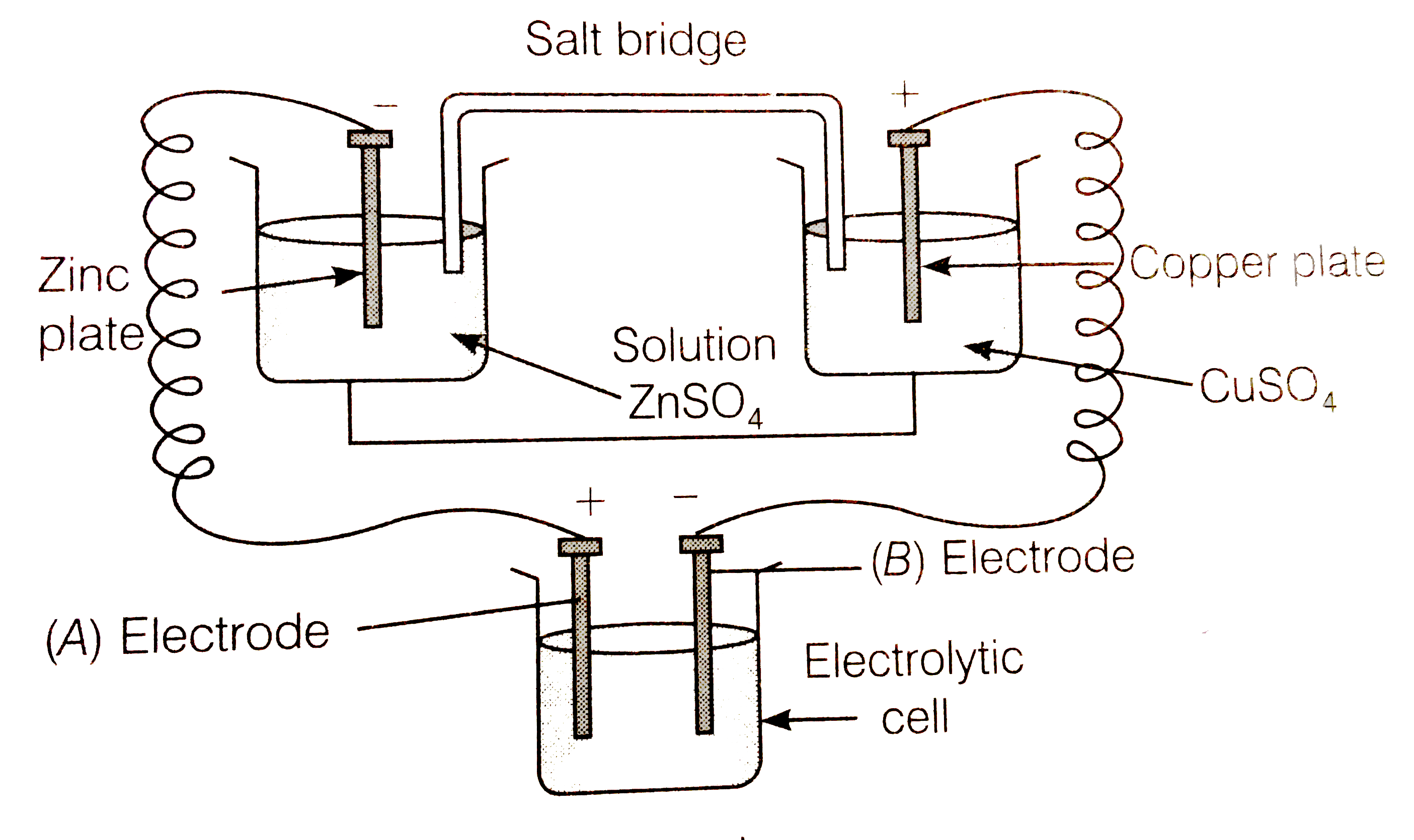An electrochemical cell an behave like an electrolytic cell when
Ecell=0
Ecell>Eext
Eext>Ecell
Ecell=Eext
The correct Answer is:C
To determine when an electrochemical cell behaves like an electrolytic cell, we need to analyze the relationship between the cell potential (E_cell) and the external voltage (E_external). Here's a step-by-step solution:
Step 1: Understand the Definitions
- Electrochemical Cell: A device that converts chemical energy into electrical energy (e.g., galvanic cell).
- Electrolytic Cell: A device that uses electrical energy to drive a non-spontaneous chemical reaction.
Step 2: Analyze the Conditions
1. When E_cell = 0: This indicates that there is no net driving force for the reaction. The cell is at equilibrium.
2. When E_cell < E_external: The external voltage is greater than the cell potential, which means that the external energy can drive the reaction in the reverse direction, making the electrochemical cell behave like an electrolytic cell.
3. When E_cell > E_external: The cell can operate normally, generating electrical energy from a spontaneous reaction.
4. When E_cell = E_external: The reaction is at equilibrium, and no net current flows.
Step 3: Identify the Key Condition
The key condition for an electrochemical cell to behave like an electrolytic cell is when the external voltage (E_external) exceeds the cell potential (E_cell). This allows the external energy to drive the reaction in the opposite direction.
Conclusion
An electrochemical cell behaves like an electrolytic cell when:
- E_external > E_cell
Thus, the correct answer is that an electrochemical cell behaves like an electrolytic cell when the external voltage is greater than the cell potential.
- Electrochemical Cell: A device that converts chemical energy into electrical energy (e.g., galvanic cell).
- Electrolytic Cell: A device that uses electrical energy to drive a non-spontaneous chemical reaction.
1. When E_cell = 0: This indicates that there is no net driving force for the reaction. The cell is at equilibrium.
2. When E_cell < E_external: The external voltage is greater than the cell potential, which means that the external energy can drive the reaction in the reverse direction, making the electrochemical cell behave like an electrolytic cell.
3. When E_cell > E_external: The cell can operate normally, generating electrical energy from a spontaneous reaction.
4. When E_cell = E_external: The reaction is at equilibrium, and no net current flows.
The key condition for an electrochemical cell to behave like an electrolytic cell is when the external voltage (E_external) exceeds the cell potential (E_cell). This allows the external energy to drive the reaction in the opposite direction.
An electrochemical cell behaves like an electrolytic cell when:
- E_external > E_cell
Topper's Solved these Questions
- ELECTROCHEMISTRYBOOK - NCERT FINGERTPS ENGLISHCHAPTER - ELECTROCHEMISTRYEXERCISE - ASSERTION & REASON
15 Videos
- ELECTROCHEMISTRYBOOK - NCERT FINGERTPS ENGLISHCHAPTER - ELECTROCHEMISTRYEXERCISE - Electrochemical Cell
1 Videos
- ELECTROCHEMISTRYBOOK - NCERT FINGERTPS ENGLISHCHAPTER - ELECTROCHEMISTRYEXERCISE - HOTS
10 Videos
- COORDINATION COMPOUNDS BOOK - NCERT FINGERTPS ENGLISHCHAPTER - COORDINATION COMPOUNDS EXERCISE - Assertion And Reason
15 Videos
- GENERAL PRINCIPLES AND PROCESSES OF ISOLATION OF ELEMENTSBOOK - NCERT FINGERTPS ENGLISHCHAPTER - GENERAL PRINCIPLES AND PROCESSES OF ISOLATION OF ELEMENTSEXERCISE - Assertion And Reason
15 Videos
Similar Questions
Electrochemical Cells
View SolutionWhat is an electrolytic cell?
View SolutionConsider the following diagram in which an electrochemical cell is coupled to an electrolytic cell. What will be the polarity of electrodes 'A' an d 'B' in the electrolytic cell?

View SolutionSemical roots behave like
View SolutionWrite three differences between electrochemical cell and electrolytic cell.
View SolutionIn an electrochemical cell that function as a voltaic cell:-
View SolutionState True or false
The chemical change in an electrolytic cell is non− spontaneous.
View SolutionIn an electrolytic cell current flows
View SolutionIt is the electrode at which oxidation takes place in an electrolytic cell .
View SolutionWhat is an electrochemical cell or galvanic cell?
View Solution
